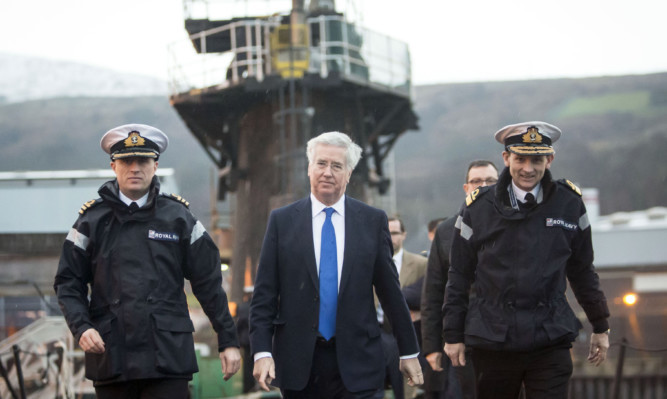A nuclear deterrent has never been needed more than in today’s less predictable, more dangerous world, Defence Secretary Michael Fallon has said.
Mr Fallon underlined the case for renewing the UK’s Trident weapons system on a visit to the Faslane naval base on the Clyde, where he received a tour of HMS Vigilant, one of the UK’s four nuclear warhead-carrying submarines.
He said he hoped a parliamentary vote endorsing the Government’s planned renewal programme will take place “shortly”.
Mr Fallon said: “We have not fixed a date yet but we need to do it, certainly this year, because we need to get on and replace these four boats to ensure the nuclear deterrent can still be provided throughout the 2030s, 40s and 50s.”
Labour leader Jeremy Corbyn this week caused upset by suggesting the country could retain its nuclear submarine fleet but deploy them without their warheads.
The defence secretary said on Thursday: “That’s like making imitation rifles – those would be pointless patrols.”
He said: “I’m here today because I want to emphasise that the nuclear deterrent has never been needed more than it is today. The world is less predictable, more dangerous.
“We’ve seen the North Korea nuclear test – now is not the time to start thinking about a world in which we wouldn’t have this basic insurance policy.”
The Ministry of Defence estimates that acquiring four new submarines to carry the Trident deterrent will cost £31 billion over the course of the 20-year procurement programme, with a further £10 billion set aside to meet any additional unexpected cost increases.
Mr Fallon said that following an informal vote in November which saw a majority in favour of the plans, the Government will be asking Parliament to approve them “soon”.
He said: “We need to get on and build the boats.
“We’re already starting to order some of the items that Parliament authorised expenditure for at the end of the last parliament, so we’re preparing the design of the boats but it takes 10 to 12 years to build a new nuclear submarine and test it properly.
“We need to get on with it now, in this parliament, so that the boats are ready to replace these Vanguard boats from the beginning of the 2030s.”
Labour is currently undertaking a defence review, with Emily Thornberry looking at the so-called “Japanese option” of retaining the capacity to build nuclear weapons without actually possessing them.
Mr Fallon said: “I hope as they do review it they will come to the same conclusion that all previous governments have come to since the end of the Second World War – that we need the nuclear deterrent.”
Rear Admiral John Weale, Flag Officer Scotland and Northern Ireland, said: “It’s UK government policy to have a nuclear deterrent capability and the SSBN (Ship Submersible Ballistic Nuclear submarines) is the most relevant, necessary and cost-effective way of delivering the nuclear defence of the UK.
“It delivers the defence of the UK as an insurance policy against extreme threats that can’t be countered by any other means.”
The SNP wants to see Trident scrapped but Mr Fallon said there was Scottishsupport for its renewal, including “mainstream” Labour voters, the tradeunions and the Scottish Conservatives.
The UK Government last year announced a £500 million investment programme at Faslane and its nearby armament depot, officially known as HM Naval Base Clyde.
Faslane is home to the Vanguard Class fleet as well as the first three of the new Astute Class attack submarines and from 2020 is expected to host all of the UK’s underwater capability.
Around 3,800 service personnel are based there along with a similar number of civilian staff.
SNP defence spokesman Brendan O’Hara MP said: “The SNP’s position is clear: weare completely opposed to nuclear weapons and will vote against the renewal ofTrident at every opportunity, whenever it comes.
“We know that Jeremy Corbyn wants to join the SNP in opposing nuclear weapons but once again we can see his leadership being undermined by a party that he cannot control and with his own Scottish leader Kezia Dugdale’s well-known support of Trident.
“Keeping the capability to launch cold war nuclear weapons, and therefore the ability to cause catastrophic and unimaginable destruction, is not a suitable solution to the threats we face in the 21st century and at £167 billion Trident is an obscenity and should be scrapped altogether.”
